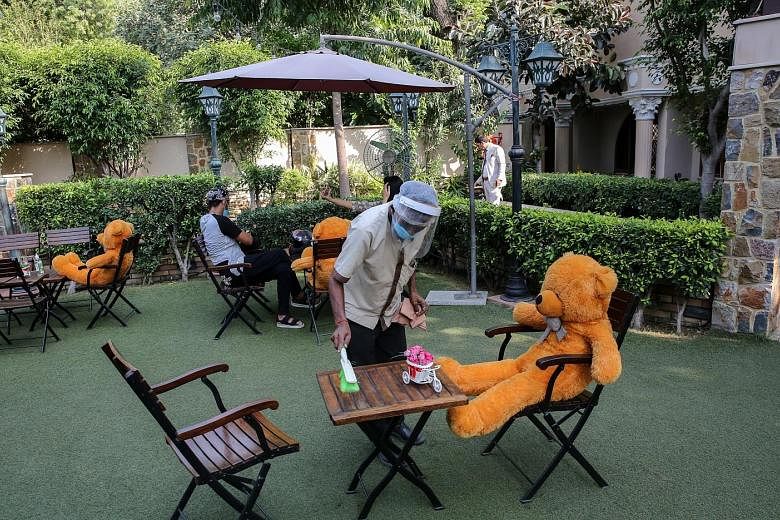Despite strict lockdowns, India has emerged as a global coronavirus hot spot that could outstrip the US at the rate daily cases are rising.
The last 24 hours up to Saturday saw 85,362 new infections in India, taking the total past 5.9 million cases.
Health Minister Harsh Vardhan has blamed "irresponsible behaviour" amid slowly eased restrictions for the daily surge in cases, while experts believe it is also a failure in communicating the importance of maintaining practices like social distancing, particularly difficult in densely populated cities.
Singer S.P. Balasubrahmanyam, who was hospitalised after testing positive for the coronavirus last month, died on Friday, aged 74. To date, some 92,290 people have died of Covid-19-related causes in India.
Still, in the 24 hours up to Saturday, 93,420 people recovered from the virus. "People are recovering, they need not panic," said Dr Rajni Kant from the Indian Council of Medical Research, adding that the high recovery rate had been a consistent trend in India.
The death rate has been lower than in other nations, at 67 deaths per million population compared with the US' 626 deaths per million population. But uncertainty remains over the trajectory of the virus in the world's second-most populous country of 1.35 billion people.
"There is a decline in some states but it's too early to predict," said Dr Kant, warning that there was no room for complacency.
The authorities are bracing themselves for the festive season, which starts next month and typically sees big crowds gathering for celebrations, including Deepavali.
"We have to remember that this pandemic has to be controlled and deaths due to Covid kept at a minimum... Crowding during the festival season can lead to an explosive situation," think-tank NITI Aayog member (health) V.K. Paul warned at a recent briefing.
India has been slowly easing restrictions since March, allowing flights, train services and the metros. Federal authorities are moving to reopen schools for senior classes in spite of resistance from parents and some state authorities.
The government has been under pressure to ease restrictions given the deteriorating health of the economy, which contracted by 23.9 per cent in the April to June period.
But the relaxations, along with the fact that people are tired of the pandemic, could lead to a rise in cases.
"There is fatigue set in and the preventive measures required to disrupt transmission are not being taken up with promptitude. People are barely complying with the masks, distancing or non-crowding," said Ms K. Sujatha Rao, a former secretary of health and family welfare. "The government should have invested much more on campaigns to educate people to bring in the desired behaviour change."
Ms Rao said that testing in some states was inadequate, with no uniform guidelines to measure work done. She said India, like the United States, did not have a well-coordinated national response.
Recent sero-prevalence studies, which test for antibodies in the population indicating previous infections, have shown that the virus was much more widespread than originally estimated or reported.
India, however, has been able to build up its capabilities during the lockdown, from ramping up testing, which touched 1.5 million samples, to increasing production of masks and protective equipment, and adding Covid-19 facilities.
The continuing concern is over how the virus spreads in rural areas where health infrastructure is weakest.
An article in the journal Lancet noted how the pandemic had led to innovation, with India being the first to use pooled testing of multiple swab samples at one go to save lab resources, and being at the forefront of vaccine development.
But the article warned: "The epidemic in India is far from over, with a potentially huge burden of mortality and morbidity to come unless public health measures are used and adhered to. Without clear and honest communication of the risks of Covid-19 to the population, stemming the epidemic will be impossible."











